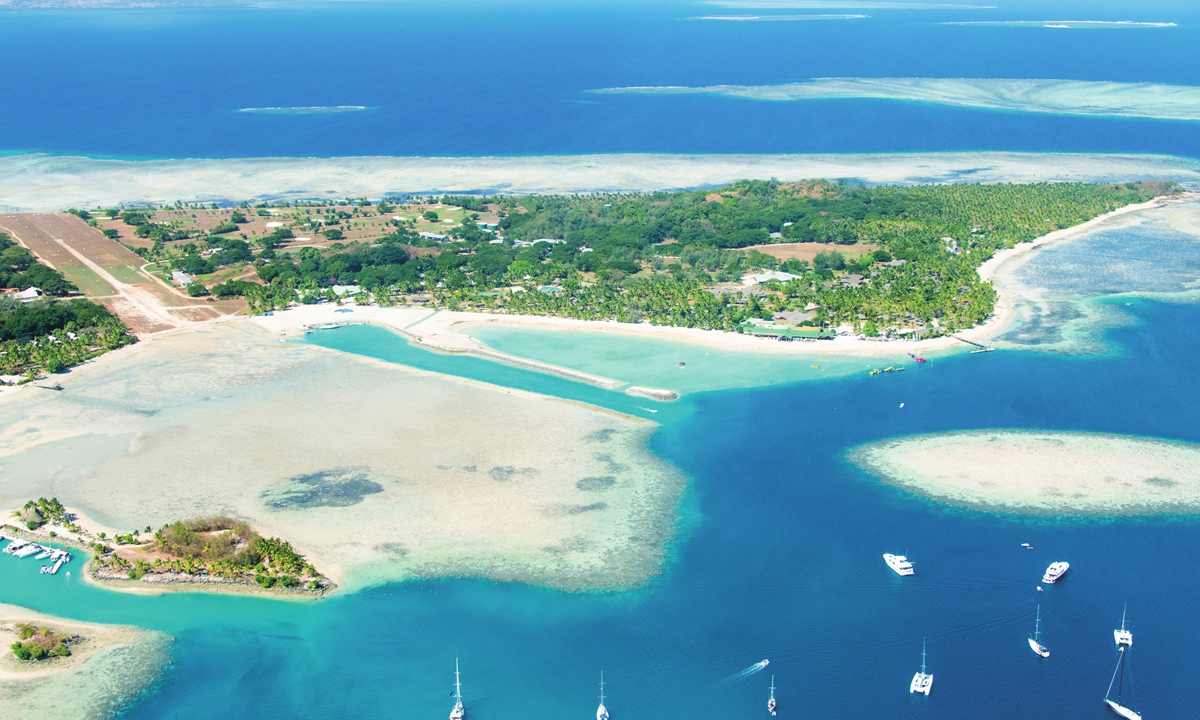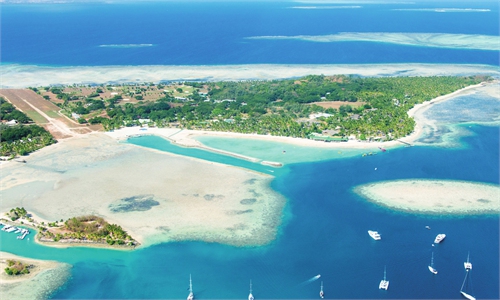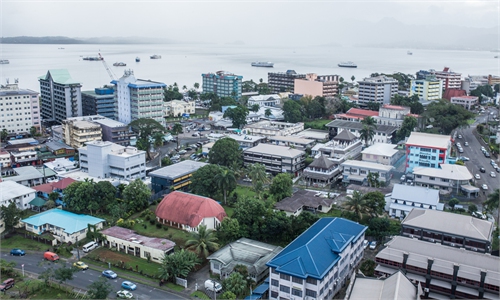
A view of a beach in Fiji Photo: VCG
After reviewing a policing cooperation deal with China for a year, Fiji decided to maintain the cooperation despite Pacific Islands countries (PICs) are facing mounting pressure from some former colonial powers such as the US and Australia, which reflects that such cooperation, fundamentally different from that with Western countries, stems from the strong demand of the PICs, Chinese experts said.
It also shows that the motivation behind the police cooperation is selfless and can genuinely help improve local security, which will contribute to creating a favorable business environment for Chinese-funded enterprises and Chinese businesspeople in the area, representing a tangible mutual benefit, experts noted.
After some media reported on Saturday that Fiji will uphold a policing cooperation with China after it had reviewed it for 12 months amid concern from Australia, the Global Times confirmed with the Chinese Embassy in Fiji on Sunday that the China-Fiji police cooperation has been restored.
Fijian Prime Minister Sitiveni Rabuka put on hold the decade-old police cooperation deal between Fiji and China shortly after forming his government in December 2022, citing differences in policing, investigations and legal systems, Reuters said.
The agreement allows for cooperation in a range of areas including the exchange of intelligence, visits, training and the supply of equipment, according to media reports. Fiji's home affairs minister, Pio Tikoduadua, was quoted as saying in a report by the Guardian on Friday that under the cooperation, "there will only be Fijian officers training in China and no embedding of Chinese officers in the Fiji police force now."
The police cooperation between China and PICs is rooted in the strong demand of those countries, Chen Hong, executive director of Asia Pacific Studies Centre at East China Normal University, told the Global Times.
"Under the long-term governance of Western colonial rule, Western countries imposed their old governance systems on the local areas without any adjustments, which resulted in them being implemented without truly taking root. This caused a governance vacuum in these countries after the colonial era ended," he said.
Also, the nature of Pacific Island countries leads to numerous tribes within a single nation constantly in conflict. Together, these factors mean that if social unrest occurs locally, there is almost no sufficient capacity, either in personnel or ability, to respond, Chen noted.
In the past, PICs often had no choice but to request Australian military and police intervention during conflicts but that was a temporary solution that did not address the root causes, as foreign military and police can only temporarily increase enforcement strength, leaving the governance system unable to stand on its own and failing to solve fundamental issues, the expert said.
"Also, Australian military and police have been seen as superior to locals, often disregarding local customs and showing ineffective enforcement during their law enforcement processes. In this context, governments of some Pacific Island countries have decided to seriously consider enhancing their police forces' governance capabilities," he said.
Some experts believe that the cooperation between China and other PICs, for example, the law enforcement cooperation between China and the Solomon Islands, has been a good example for other PICs.
"Former colonial powers like the US have also engaged in police cooperation with island nations, but their focus has been on how to strengthen control over local military, police and governments. In contrast, China's cooperation with these island countries emphasizes enhancing law enforcement and crime-fighting capabilities without interfering in domestic affairs," Yu Lei, a professor at Shandong University, told the Global Times.
This cooperation with China is highly regarded by local societies but is not welcomed by countries like the US and Australia. This is mainly because, after cooperating with China, the island nations now have a point of comparison and, whether in terms of technology or public sentiment, are more inclined to cooperate with China, Yu said.
China's increasing presence in the South Pacific has caught the attention and even the anxiety of the US.
Daniel Kritenbrink, Assistant Secretary of State for East Asian and Pacific Affairs, told the Senate Foreign Relations Committee recently that the US will open an embassy in Vanuatu "imminently" and is working to get the approval of the parliament in Kiribati for a mission. He also reiterated warnings to Pacific Island countries of the dangers of agreements with China, Reuters reported on Friday.
The US and Australia have traditionally viewed the South Pacific as their sphere of influence, intending to turn the region into a base for containing China, and they have significantly obstructed China's cooperation with PICs, experts said.
"Western and US media also deliberately confuse concepts, intentionally using the term 'security,' which can refer to both social order and national defense security. Thus, they purposefully portray cooperation in social governance and policing as military cooperation, furthering their own militarization in the region," Chen said.
Also, they bribe local opposition parties to intentionally smear the cooperation between China and the local countries. This approach has indeed had some effect, leading new governments to spend a considerable amount of time reviewing cooperation agreements with China, during which the interference from the US and Australia is evident, the expert added.


